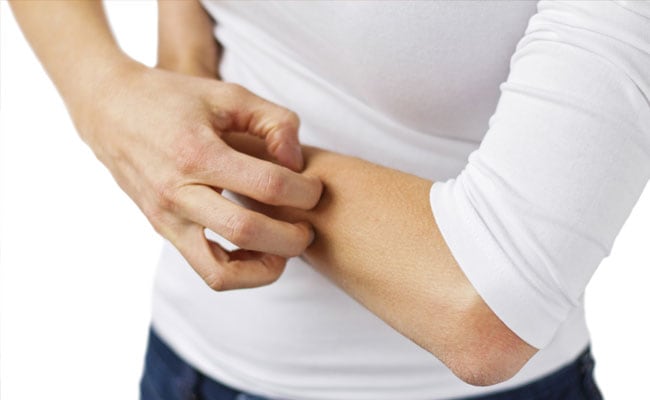Allergies: Do you have allergies? Do they affect you on a daily basis? Then you have landed at the right place. Dr. P. Srinivasan tells everything about allergies and why early diagnosis is the key to managing them in the long run.

Symptoms of allergies can range from from minor irritations to anaphylaxis
HIGHLIGHTS
- 25-30% of Indian population suffer from allergies
- The severity of allergies varies from person to person
- Allergen immunotherapy is used for treating allergies
Allergies happen when one's immune system adversely reacts (hypersensitivity) to foreign substances (allergens) like pollen, dust, certain fragrances, dyes and food items which would usually not evoke such a response in most individuals. Allergies are often under-diagnosed or treated as a symptom of hypochondria as it is not considered a life-threatening problem. However, they pose a significant socioeconomic burden as a result of a reduced quality of life and productivity, and the impact it has on everyday life can be explained only by a person suffering from allergies, feels Dr. P. Srinivasan.
Here's what he has to say about allergies and why you should take them seriously
Prevalence of allergic diseases is rising globally, currently affecting 25-30% of Indian population, it is one of the top ten reasons for consulting a primary care physician.
When an individual is exposed to allergens (substance that causes allergic reactions), his/her immune system's reaction can cause inflammation of the skin, sinuses, airways or the digestive system. The severity of allergies varies from person to person and range from minor irritations to anaphylaxis, which is a potentially life-threatening emergency.

Allergies can cause minor, but frequent irritations, affecting your day-to-day functioning
Photo Credit: iStock
Also read: 6 Eye Allergies You Should Be Aware Of
Diagnosis of allergies: The first step
The first step towards the treatment of an allergy is its diagnosis.
The diagnosis of allergies, or allergic diseases, is based on a combination of the patient's clinical history, symptoms, family history, physical examination, skin prick tests and laboratory tests. These tests serve to find out the nature of the allergy and to identify potential allergic triggers.
The diagnosis of allergy begins with a clinical history. It's about determining the patient's general health condition. It's important for a doctor to understand the symptoms that are troubling the patient; and determining the conditions such as asthma and eczema that may coexist with allergic disorders.
It is also important for the doctor to know whether any of the allergic patient's close relatives have allergic symptoms and whether they have been diagnosed with an allergic disorder such as asthma, hay fever, eczema, or allergic sensitivity to certain kind of foods or medications.
Post ascertaining the clinical and family histories, there's a complete physical examination with more emphasis on the eyes, ears, nose, throat, chest and skin. Allergy tests are performed to determine whether an individual is allergic or not; and if yes, what she / he is allergic to. Skin tests are carried out by applying drops of allergens to one's skin and then scratching or pricking though them. Blood tests may also be performed to evaluate for the presence of Allergy specific IgE (which is central to the disease mechanism) against specific allergens from patient's blood to guide treatment.
Also read: 6 Things That Can Cause Penis Allergies After Sex
Treatment of Allergies
Once the nature of allergy is identified, doctors advise patients on taking steps to avoid the allergy triggers. This is one of the most important steps towards preventing allergic reactions and reducing symptoms. Also depending on one's allergy condition, relevant medications can help reduce the immune system reaction and ease symptoms. These medications could be OTC (over-the-counter) or prescription based in the form of tablets / capsules, syrups, nasal sprays and eye drops.
For certain allergies that are not relieved by medication, doctors may recommend allergen immunotherapy. This treatment involves a series of injections of purified allergen extracts, usually given over a period of time. Another form of immunotherapy is a tablet that's placed under the tongue until it dissolves. And if one has a very severe allergy condition, the doctor may advise need to carrying an emergency epinephrine shot at all times...this shot helps in reducing symptoms until one gets emergency treatment.
In a nutshell, on-time diagnosis can help in patient management, providing relief from symptoms and reduce the impact of allergies in a person's day-to-day functioning.
Also read: Here Are Top Five Myths About Spring Allergies You Must Know
(Dr. P. Srinivasan is Technical Director and Chief of Lab - Tamil Nadu at Neuberg Diagnostics Private Limited. He is MD in Internal Medicine from Madras Medical College)
Disclaimer: The opinions expressed within this article are the personal opinions of the author. NDTV is not responsible for the accuracy, completeness, suitability, or validity of any information on this article. All information is provided on an as-is basis. The information, facts or opinions appearing in the article do not reflect the views of NDTV and NDTV does not assume any responsibility or liability for the same.
DoctorNDTV is the one stop site for all your health needs providing the most credible health information, health news and tips with expert advice on healthy living, diet plans, informative videos etc. You can get the most relevant and accurate info you need about health problems like diabetes, cancer, pregnancy, HIV and AIDS, weight loss and many other lifestyle diseases. We have a panel of over 350 experts who help us develop content by giving their valuable inputs and bringing to us the latest in the world of healthcare.














